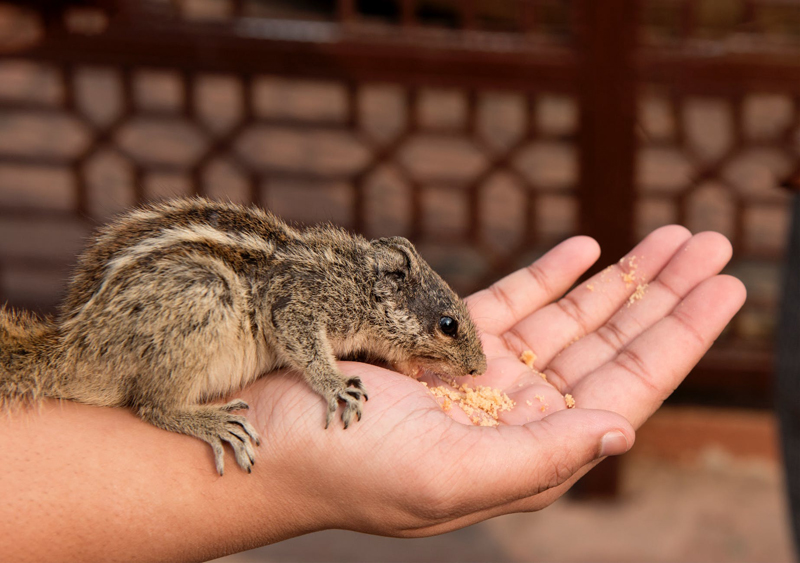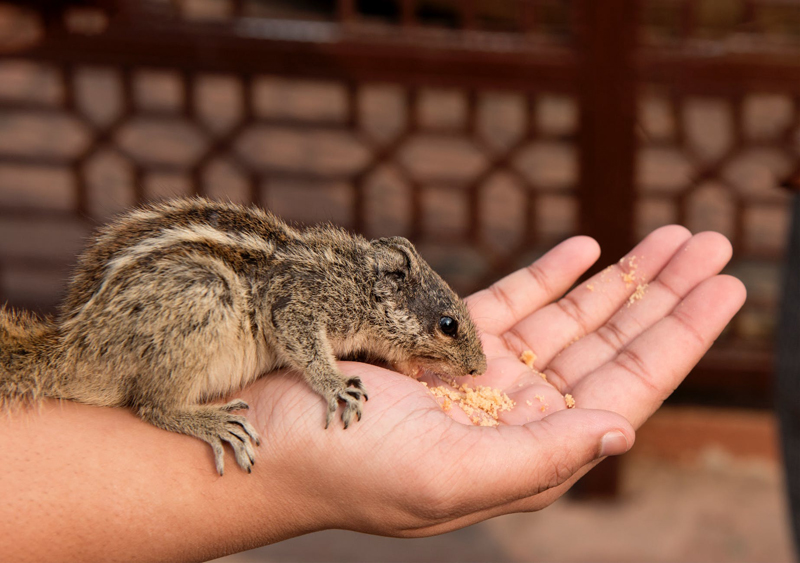Striped Skunk

Prominent skunk researcher Jerry Dragoo found through genetic testing that skunks didn’t belong to the weasel classification at all (the Mustelidae family). Instead he found they deserved their own classification Mephitidae (which includes 12 species of skunks). Some of the skunks that are more familiar are the spotted skunk, the North American striped skunk, the hooded skunk, and the North American hog-nosed skunk.
Striped skunks are almost exclusively nocturnal, active in the early evening hours and most of the night. They live in dens under rocky outcroppings, banks, lumber piles, stumps, crevices, or sometimes in dens that were made by other animals. Sometimes they live under old abandoned houses. Often in the warm summer months they will bed down in vegetation. Skunks are highly social and many skunks will often live together. They conserve body heat during the winter months sleeping together. They can also hunt together. Skunks are very loving and protective of their young.
Skunks do not actually hibernate but become inactive for periods of days or weeks. True hibernation is a declined heart rate and living off of stored body fat and skunks do not do this.
The wild Striped skunk eats bugs, rodents, vegetation, snakes and frogs.
The Striped skunk will make a peculiar purring sound and may even growl when it is startled. Before emitting its sulfuric-like spray in self defense, it will warn first by raising it’s tail and stomping it’s feet. The spray not only has a terrible odor but can temporarily blind it’s target. A skunk’s spray is not urine. It is musk produced by a pair of musk glands about ¾’ in diameter and located on both sides of the rectum. This spray can reach an enemy 10 to 15 feet away.
The Skunk has been raised domestically for over 100 years. Fur farms began breeding the skunk domestically. The skunk fur was sold as martin fur. Now skunks are raised domestically for pets.
A common myth about the skunk is that they are rabies carriers, and that all domestic skunks have rabies. I have bought three of my skunks from Ruby Farms in New Sharon, Iowa all healthy wonderful animals. The Ruby's Fur Farm has not had a single incident of rabies since 1932. I have a friend who has had her domestic skunks live into their twenties; did they die of rabies? NO, they died of old age! The most shocking and frightening thing about this misconception is that some misinformed veterinarians believe this nonsense also!
Skunks do NOT carry rabies. This is a dangerous myth. They can become infected with rabies like any other warm-blooded mammal. Typically this is when they are bitten by a rapid animal or eat a carcass of an animal that died of rabies or was infected with rabies when death occurred. If a veterinarian states that all skunk carry rabies find another veterinarian. Cows become infected with rabies more often than dogs, cats, or domestic skunks.
On the news was a story about an enormous increase of wild rats in California. These rats were a major concern because of disease problems. In the broadcast, new homes were shown. Over populations of pests are usually controlled by nature itself. Why the big problem? Many of the natural enemies of the rats are being driven away from newly formed populated areas causing serious damage to the natural ecosystem. Many of the wild animals that kill and eat rats are trapped and killed. These problems will escalate until man learns to live within our natural ecosystem.
The wild skunk is your friend and a very crucial part of our ecosystem. They kill garden pests that destroy your garden; you know the grubs and snails, and the rest of the insects that find your vegetables before you do! Our friend the skunk also controls populations of cockroaches, mice and rats from breeding rampantly. Look at the areas that have become overgrown with human population driving the wildlife away; many of these areas have serious pest problems that can cause horrific diseases to spread with no control. The skunk can also control populations of rattlesnakes, and poisonous bugs like the black widow spider and scorpions. However, people don't want skunks traipsing through their yards.
Usually skunks won't get to close to your house if there isn't food to attract him. Keep pet food out of reach and in closed containers. Keep trash picked up. If they are living under your house and you don't want them, they can be repelled by stinky stuff like mothballs. Believe it or not they have very picky, sensitive noses. They also hate loud music. Lay the speakers on the floor, preferably with a large amount of bass.
If this world is to endure, if humanity is to survive, we must respect all life. Just because the almighty human becomes inconvenienced all other life has to suffer.
How to remove skunk smell in my house or how to remove skunk smell from dogs, or just how to remove skunk smell is pretty simple. skunk smell
***The Latest in Popular Pets - Skunks
***Skunks as a Pet
*** Skunks Need PR Consultant
***Off Label Drugs/rabies
Subscribe free to the exotic pets newsletter. It is quick and easy Just glance to the right or scroll a bit to the bottom and subscribe. I will only bug you once a week :) Be the first to be in the know! Your information is always private!
I am also the Bird editor if you enjoy pet birds subscribe to the Birds newsletter. Birds BellaOnline
Join Exotic Pets Bellaonline on Facebook and Twitter - be sure to click the "like" Exotic Pets Facebook
Exotic Pets @ Twitter
Join Exotic Pets Bellaonline on Facebook and Twitter - be sure to click the "like" Exotic Pets Facebook
Exotic Pets @ Twitter
Ferrets: A Complete Guide available in paperback, PDF, and Kindle. By Diana Geiger (me:) Five star reviews! Also available at Barnes and Noble online. Request to order at any bookstore.

Ferrets: A Complete Guide - Paperback
Ferrets: A Complete Guide - Kindle
PDF Version Ferrets: A Complete Guide (Access to free PDF Reader)
Ferrets: A Complete Guide
This site needs an editor - click to learn more!
You Should Also Read:
Complete Exotic Pet Index
Ferrets - A Complete Guide Paperback and Kindle
Exotic Pet Shopping (the safest for your pets)
Related Articles
Editor's Picks Articles
Top Ten Articles
Previous Features
Site Map
Content copyright © 2023 by Diana Geiger. All rights reserved.
This content was written by Diana Geiger. If you wish to use this content in any manner, you need written permission. Contact
BellaOnline Administration
for details.






